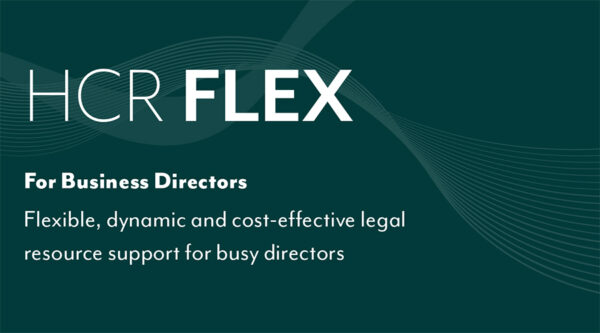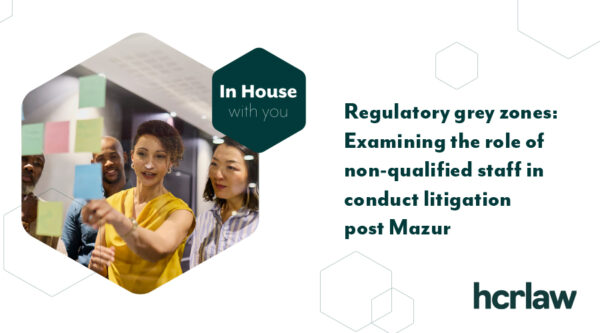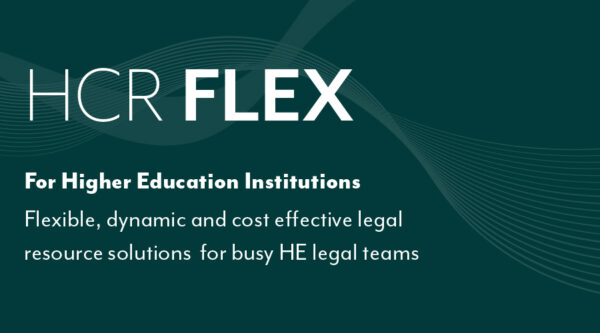

As the legal landscape continues to evolve, the in-house legal market is undergoing a remarkable transformation.
This year, we’ve hosted a series of exclusive forums for senior in-house lawyers and general counsel (GCs) – most notably our roundtable breakfast in October at our London office and a private dinner on operational excellence in Birmingham. These events offered an insight into the pressures and possibilities facing legal teams today.
Because our commercial team frequently works in-house on secondment – and because our forums bring together legal leaders from a wide spectrum of businesses – our reflections come from lived experience, not just theory.
Redefining the role of in-house counsel
Discussions revealed how the role of the modern GC is expanding, with legal leaders increasingly expected to advise on governance, sustainability and growth strategies, alongside legal risk.
GCs and senior legal leaders shared how they’re now expected to guide business decisions, contribute to growth strategies and align legal outcomes with enterprise goals.
Environmental, social and governance (ESG) compliance, regulatory complexity and digital disruption were all cited as areas where legal teams must step out of the ‘legal silo’ and operate alongside business leadership.
As one participant put it: “The modern GC must possess not only deep legal expertise but also strong business acumen, financial fluency and a tech-savvy mindset.” This sentiment echoed throughout our events, highlighting the need for legal leaders to be commercially minded, digitally literate and resilient in the face of change.
Accelerating with technology
A common takeaway from our events was that in-house legal teams need to save time. With increasing workloads, tighter budgets and rising stakeholder expectations, hours are a premium.
Technology is helping legal teams do more with less, moving from task execution to strategic contribution. According to the LexisNexis In-House Legal Tech Report 2025, only 23% of in-house counsel anticipate their teams will grow in size; instead, they’re expected to scale up with new technology, with 51% foreseeing increases to technology budgets this year.
At our breakfast and dinner events, attendees described how they expect external providers and internal processes to be faster, clearer and more value-focused. Speed matters. The ability to deliver real-time advice, rapid contract turnaround and proactive legal insight is increasingly a differentiator.
AI was a key topic of discussion, highlighting both enthusiasm and caution. According to the Juro State of In-House 2025 report, 93% of in-house lawyers believe their boss wants them to increase their use of AI. While 83% have used AI for legal research and 79% to draft clauses, only 31% have tried it for redlining in the last 12 months, revealing a gap between aspiration and implementation.
Several participants emphasised the need for human oversight. The challenge isn’t just adopting technology; it’s embedding it into workflows, supported by change management, governance and talent. As one attendee put it: “Successful legal tech adoption is 80% organisational, 20% technological.”
Cost efficiency, value creation and operational excellence
Another major theme from our discussions was the growing need for cost-efficiency in the legal function. Many in-house teams are under pressure from senior leadership to deliver more with less, making cost control a top strategic priority.
Legal leaders at our events emphasised the importance of working with external providers who offer high-quality advice, but also flexible, transparent models that deliver value. The shift is away from fee-per-hour billing towards outcome-based and flexible resourcing, aligning legal spend with business outcomes.
This was echoed in our operational excellence workshop, where teams explored how to balance demand and capacity, enable legal tech and optimise value. Many are bringing more work in-house or adopting hybrid models to reduce cost and improve speed. Juro’s research shows 45% of in-house lawyers rated large law firms’ value for money as “poor” or “terrible”, citing overpriced services, poor-quality advice that lacks commercial relevance and the outdated hourly billing model.
Our HCR Flex service is a direct response to this need, offering flexible, transparent support that delivers value, not just advice. We’re committed to being a true partner to in-house teams, helping them scale quickly and efficiently without compromising on quality.
Talent, skills and future-proofing legal teams
At our events, legal leaders emphasised the importance of building capability, not just capacity, within their teams. Hybrid roles that combine legal expertise with compliance, risk, data privacy, operations and tech fluency are increasingly in demand.
Retention and development programmes were front of mind for our delegates. Several attendees reflected on the need to invest in internal talent, create career pathways aligned with the evolving remit of the legal team and attract people who are comfortable combining legal, business and operational perspectives.
According to the Michael Page 2025 Talent Trends report, work-life balance and job satisfaction remain top priorities for professionals. Notably, three-fifths of respondents said they would refuse a promotion if it compromised their wellbeing. This highlights the need for legal teams to offer clarity around flexibility, culture and career progression, as well as competitive packages.
Demand for future-proof skills also continues to grow. In a world where AI and automation are becoming part of everyday workflows, our attendees discussed how the next generation of in-house counsel must develop tech fluency, process understanding and a strategic mindset alongside core legal skills.
To stay competitive, legal leaders must foster a culture of continuous learning, align their talent strategies with evolving expectations and communicate clearly about what they offer.
Organisations that do this well will be best placed to attract, retain and empower future in-house legal talent.
Operational excellence and external support
Because our insights stem from direct dialogue with senior legal leaders – and because our commercial team has sat in the in-house seat themselves – we understand how the best legal functions operate. They consistently emphasise:
- Clear, straight-talking external advice at pace
- Flexible, cost-effective resourcing – especially when peak demand or specialist knowledge is required
- Legal operations maturity: horizon scanning, stakeholder expectation mapping, demand and capacity planning, legal tech enablement and metrics-driven value optimisation.
At our private dinner and workshop, attendees valued the opportunity to share real-world challenges, bounce ideas off peers and build relationships in a confidential space. It’s through forums like this that practical insights emerge, which can help shape the future of the in-house legal function.
Preparing for the future: strategic partnerships and external support
The future of the in-house legal function will involve deeper collaboration with external partners. As GCs face increasing demands on time and resources, many are turning to alternative legal service providers and flexible law firm models to fill gaps in expertise or manage peak workloads.
This was a key takeaway from our roundtable discussions, where legal leaders highlighted the value of flexible resourcing models that allow in-house teams to scale quickly, without the overhead of hiring full-time staff. Our own events reinforced the importance of these partnerships, not just in terms of cost, but in terms of expertise, speed and alignment with business outcomes.
Looking ahead: key imperatives for in-house legal teams
Drawing together insights from our events and wider market data, several imperatives stand out for legal teams preparing for the future:
- Embed technology into workflows – not just pilot it. Saving time is no longer optional. Technology must free up legal teams to operate strategically, rather than get bogged down in transactional work
- Upskill for hybrid fluency – the future in-house lawyer is part legal expert, part risk strategist, part technology advocate
- Measure impact, not just activity – legal functions must move from “hours spent” to “value delivered”, using metrics that reflect business outcomes
- Forge strategic partnerships – external support should amplify, not duplicate. The best partnerships bring speed, clarity and flexible capacity
- Prioritise wellbeing and retention – with rising expectations and heavy workloads, the legal function that thrives will be one that manages capacity, preserves culture and gives its people space to lead.
Legal teams that embrace these imperatives will be better placed to deliver value, navigate complexity and shape the future of the in-house function.
Conclusion
The in-house legal market is in the midst of a dynamic shift, driven by technology adoption, rising expectations, talent competition and the need for strategic relevance. Our experience, both through in-house secondments and senior GC forums, gives us a unique vantage. We’ve heard the challenges, seen the frustrations and witnessed the breakthroughs.
For in-house counsel, the journey ahead is less about adapting to change and more about leading through it. Those who adopt technology thoughtfully, invest in continuous capability development, form smart partnerships and measure what really matters will set the pace. And for those convened in peer-level forums, sharing experience becomes not just a support mechanism, but a competitive advantage.
Our events underscored the value of confidential spaces where senior legal leaders can share candid insights and shape the future of legal service delivery together. We remain committed to facilitating these high-value conversations and supporting the in-house legal community as it evolves.










